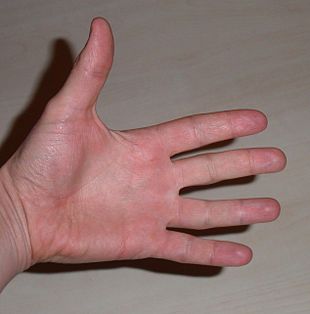Hand
From Wiktionary, the free dictionary
English
Etymology
Pronunciation
- Rhymes: -ænd
Proper noun
Hand
- A surname.
Derived terms
Anagrams
Central Franconian
Alternative forms
- Hank (chiefly western Ripuarian)
Etymology
From Middle High German and Old High German *hand, northern variant of hant. The regular form in Moselle Franconian and some southern dialects of Ripuarian is Hand with a plural Hänn (< *hende) through the development: intervocalic -nd- → -nn-. The regular form in most of Ripuarian is Hank with a plural Häng (< *henge) through velarization and subsequently a corresponding development: intervocalic -ŋg- → -ŋŋ-.
These regular systems are preserved in Moselle Franconian and western Ripuarian. In many eastern and central Ripuarian dialects, the native velarization has to a large degree been reverted under the influence of standard German and surrounding varieties. This reversion, which has emanated from Cologne, is irregular, affecting -nk more than it does -ng-, and hence it has led to occasional variation between velarized and de-velarized forms within the inflectional paradigm of one word (compare Wand, Zand, schänge).
Pronunciation
Noun
Hand f (plural Hänn or Häng, diminutive Händche)
- (many dialects) hand
Usage notes
- The plural Hänn is used in Moselle Franconian and some southern dialects of Ripuarian. The form Häng is used in many Ripuarian dialects, including Kölsch.
German
| Picture dictionary | ||
|---|---|---|
| ||
|
Etymology
From Middle High German hant, from Old High German hant, from Proto-West Germanic *handu, from Proto-Germanic *handuz.
Compare Dutch hand, English hand, West Frisian hân, Danish hånd, Gothic 𐌷𐌰𐌽𐌳𐌿𐍃 (handus).
Pronunciation
Noun
Hand f (genitive Hand, plural Hände, diminutive Händchen n or Händlein n)
- hand
- 1931, Arthur Schnitzler, Flucht in die Finsternis, S. Fischer Verlag, page 103:
- Rette mich, murmelte er vor sich hin, unwillkürlich mit gefalteten Händen, als wäre es ein Gebet an sie.
- Save me, he mumbled to himself, involuntarily with folded hands, as if it was a prayer to her.
- (by extension) handwriting
- 1787, Friedrich Schiller, Don Karlos, Infant von Spanien, 3. Akt, 3. Auftritt:
- Es ist Don Carlos' Hand.
- (please add an English translation of this quotation)
Declension
Declension of Hand [feminine]
Derived terms
- abhanden kommen
- alle Hände voll zu tun haben
- aushändigen
- behende
- Hand in Hand
- Handball
- Handballen
- Handbewegung
- Handbreit
- Handbremse
- Handbuch
- Händchenhalten
- Händedruck
- händeringend
- handfest
- Handfläche
- handgeführt
- Handgelenk
- Handgemenge
- Handgranate
- handgreiflich
- Handgriff
- Handhabe
- Handkäse
- Handlanger
- handlich
- Handpuppe
- Handreichung
- Handrücken
- handsam
- Handschelle
- Handschlag
- Handschrift
- Handschuh
- Handstand
- Handtasche
- Handteller
- Handtuch
- handverlesen
- handwarm
- Handwerk
- Handwurzel
- handzahm
- kurzerhand
- leichterhand
- mit leeren Händen
- rechte Hand
- unsichtbare Hand
- vorhanden
Related terms
- Handen
- zuhanden
Noun
Hand n or f (strong, genitive Hands or Hand, no plural)
- (soccer, informal) Short for Handspiel.
- Das war Hand!
- That was a handball!
- Das erste Hand war vor dem Strafraum, aber das zweite hätte Elfmeter geben müssen.
- The first handball was outside the box, but the second one should have been a penalty.
Usage notes
- Generally used without preceding articles, determiners, or adjectives. When they are used, however, they tend to be neuter rather than feminine.
Further reading
- “Hand” in Duden online
- “Hand” in Uni Leipzig: Wortschatz-Lexikon
- “Hand” in Digitales Wörterbuch der deutschen Sprache
- “Hand” in Deutsches Wörterbuch von Jacob und Wilhelm Grimm, 16 vols., Leipzig 1854–1961.
- Friedrich Kluge (1883) “Hand”, in John Francis Davis, transl., Etymological Dictionary of the German Language, published 1891
Hunsrik
Low German
Luxembourgish
Pennsylvania German
Wikiwand - on
Seamless Wikipedia browsing. On steroids.

